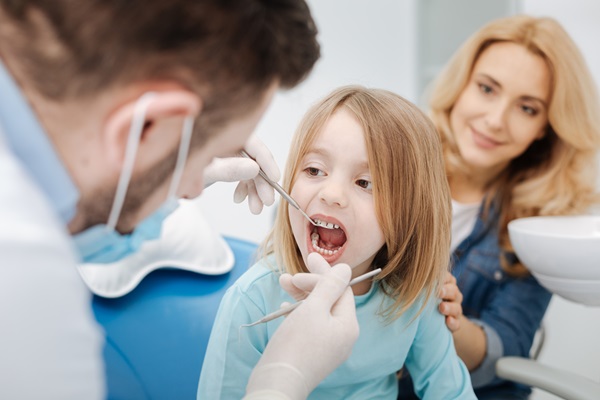Common Reasons to Visit a Pediatric Dentist

The pediatric dentist specializes in dental services for younger patients. These include teething toddlers to teenagers. Younger patients typically have dental needs that are different from those of adults. This review highlights the most common reasons to visit a pediatric dentist.
Six reasons to visit a pediatric dentist
Taking a child to see a pediatric dentist at a young age can help keep their teeth healthy, promote healthy habits that carry into adulthood, and get an early start on orthodontic care. The following expands upon each of these reasons and more.
Healthy dental habits
One of the primary goals of pediatric dentists is to help patients develop healthy dental habits at the youngest age possible. This way, they are more likely to care for their teeth properly as they grow older and gain more independence. It starts with simply visiting the dentist regularly at a young age, which helps reduce the risk of dental anxiety and phobia later. Additionally, through educational services, pediatric dentists can teach younger patients how to properly care for their teeth between visits in a manner that they understand. This includes learning proper brushing techniques, how diet affects oral health, the importance of flossing, and more.
Plaque and tartar removal
Plaque and tartar can build up on teeth despite a quality oral care routine between visits. Regular visits with the pediatric dentist for a check-up and cleaning are necessary to remove plaque and tartar accumulation. This keeps the eeth clean and helps prevent cavities and other oral health concerns. Check-up and cleaning visits are recommended for younger patients around two or three times per year (every four to six months).
Cavity prevention and treatment
The most common type of oral health concern that children and teenagers experience is a cavity, which is a small hole that forms on a tooth. Pediatric dentists focus on the prevention of cavities through regular dental cleanings. Children, especially those who still have baby molars, may also benefit from dental sealants. These plastic coatings are placed over the chewing surfaces of the teeth that are the most vulnerable to cavities.
If cavities start to form, prescribed fluoride treatment can reverse the effects in the earliest stages of decay. If cavities develop fully, pediatric dentists can treat them in a variety of ways. The most popular cavity treatment method is a dental filling procedure. For more severe cavities, a (baby) root canal may be necessary.
Early orthodontic care
Early orthodontic care, also called interceptive orthodontic treatment, is recommended for patients as young as six years old. The goal is to minimize the severity of orthodontic concerns before the child’s permanent teeth fully emerge. This is usually recommended for children who are more likely to have misaligned teeth and bite issues. Treatments with early orthodontic care from a pediatric dentist may include but are not limited to palatal expanders and early braces.
Corrected misaligned teeth and bite issues
Many pediatric dentists also offer orthodontic services, such as braces and clear aligners. This is recommended after children have all or most of their permanent teeth. Orthodontic care at a pediatric age is often best because this is when the jaw and teeth are more malleable. Braces and clear aligners are used to correct:
- Overcrowding
- Crooked teeth
- Gaps between teeth
- Protruding teeth
- Bite issues (e.g., underbite)
Specialized dental care
Children who visit a pediatric dentist often feel more comfortable because the office is specifically tailored for kids. Many may even go to the same dentist office that their friends do. In pediatric dentistry, the care is focused on what best serves children. This specialized care ensures that they get the treatment that they need in the least invasive manner possible.
Pediatric dentist vs. general dentist for children
Both pediatric dentists and general dentists are licensed and able to provide high-quality dental care. Pediatric dentists usually go the extra mile to make younger patients feel comfortable, whereas general dentists typically focus on what best serves adult patients, even if they also offer services for children. Overall, pediatric dentists help children learn healthy habits and begin to feel comfortable visiting the dentist on an ongoing basis.
Contact our pediatric dentistry to schedule a visit
Here at our pediatric dentistry office, we encourage parents to bring their child in for a visit every four to six months, starting once the child reaches the age of one. If you have questions or concerns or are ready to schedule a visit for your child, contact us today.
Request an appointment here: https://nettsmiles.com or call Nett Pediatric Dentistry & Orthodontics at (623) 759-7658 for an appointment in our Phoenix office.
Check out what others are saying about our dental services on Yelp: Pediatric Dentist in Phoenix, AZ.
Recent Posts
Once your child’s first few teeth come through (usually before age one), it is time to schedule a pediatric dentistry visit. They can help ensure the teething process goes smoothly and address oral developmental concerns promptly. This review discusses several signs that indicate your baby has started the teething stage.Teething can begin as early as…
In pediatric dentistry, dentists assess how certain food types affect oral health and make recommendations accordingly. Common childhood snacks can harm teeth by breaking down enamel and contributing to periodontal diseases, such as sugar-filled yogurt packs, cookies, and citrus fruits.This review takes a closer look at snacks parents can provide for their children that are…
Once teething starts, you should pay close attention to your child's teeth to avoid tooth decay, cavities, and other oral health problems. A dentist specializing in pediatric dentistry might advise against pacifiers and other items that might interfere with the healthy development of their oral tissues. Sucking on a pacifier is common among infants and…
Pediatric dentistry is a vital part of a child's healthcare team. They are responsible for the oral health of babies, children, and adolescents. A pediatric dentist has the education and experience to care for a child's unique dental needs. In addition, they can provide preventive care, diagnosis, and treatment of various dental problems.Parents need to…


